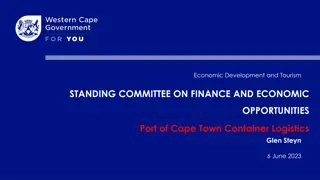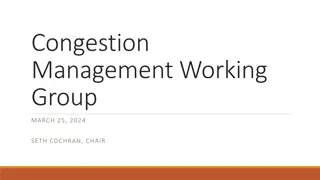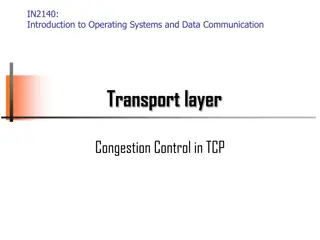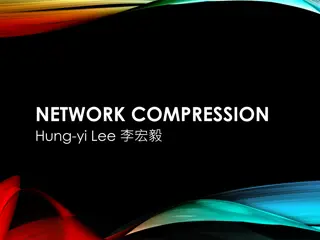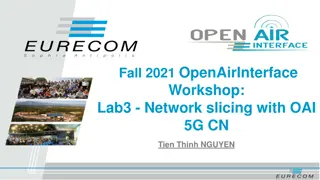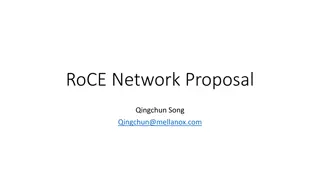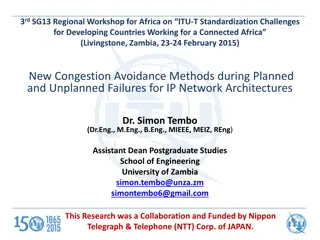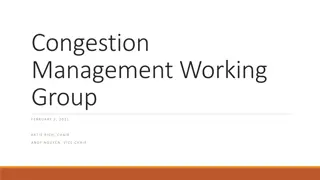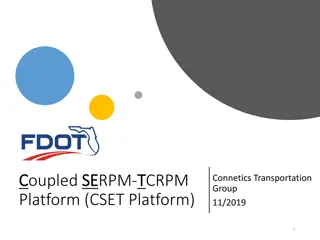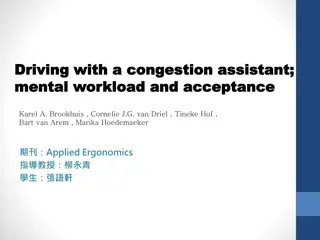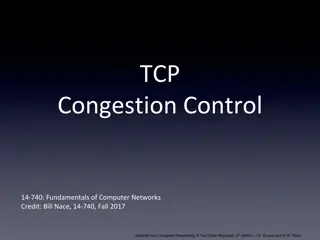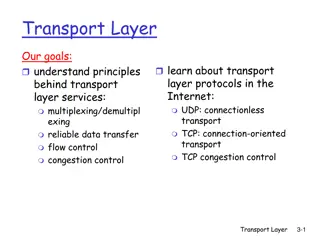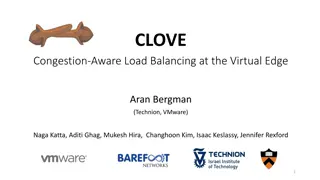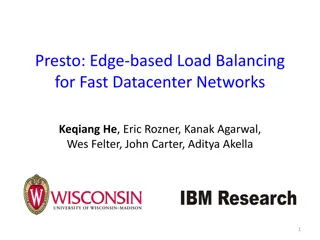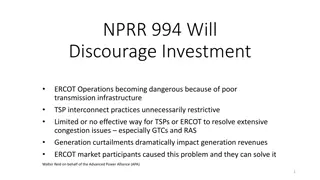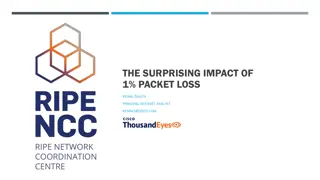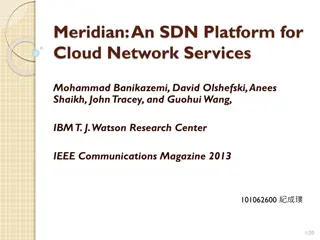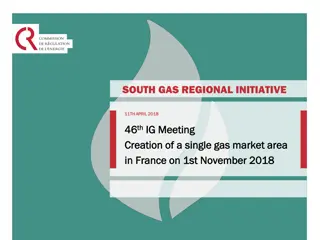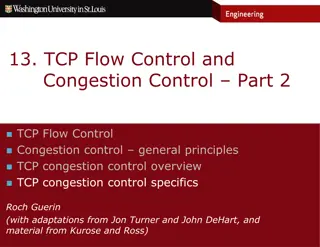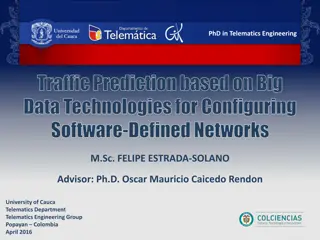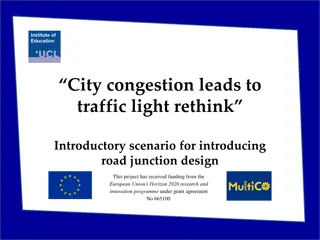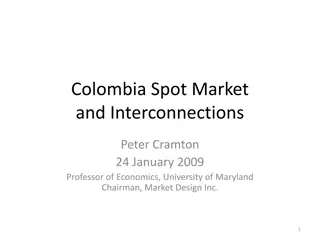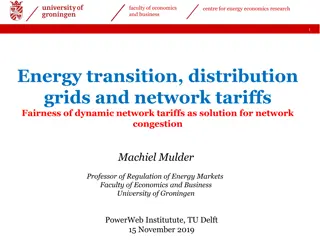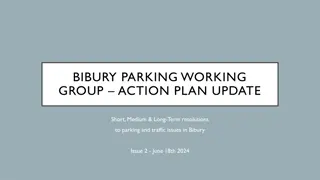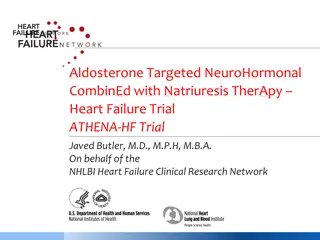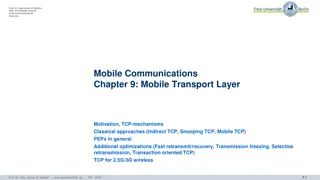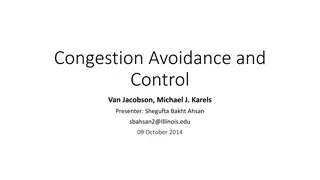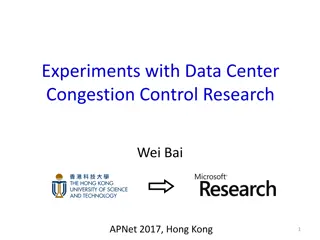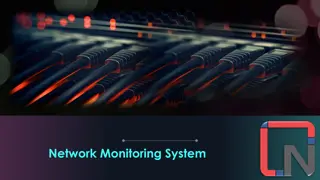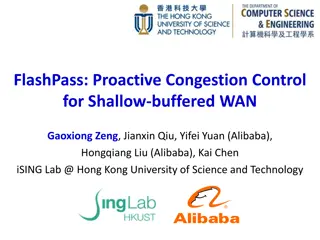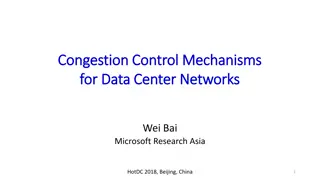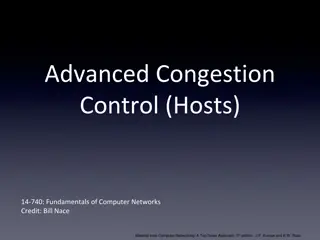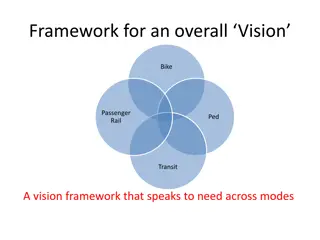Enhancing Container Logistics at Port of Cape Town: Collaboration and Priorities
The presentation discusses the collaborative efforts and key priorities identified since December 2019 to improve container logistics at the Port of Cape Town. It highlights challenges faced, including congestion and communication issues, and proposes solutions such as upgrading equipment, enhancing
5 views • 17 slides
Modeling and Generation of Realistic Network Activity Using Non-Negative Matrix Factorization
The GHOST project focuses on the challenges of modeling, analyzing, and generating patterns of network activity. By utilizing Non-Negative Matrix Factorization (NMF), realistic network activity patterns can be created and injected into live wireless networks. Understanding and predicting user behavi
4 views • 28 slides
Electric Grid Congestion Management Updates
Working Group updates on congestion management strategies including proposed fixes for reliability deployment pricing, mitigations for ESRs, and congestion mitigation using topology reconfigurations. Discussions covered locational price signals, resource payments, offer cap designs, and operational
0 views • 4 slides
Understanding TCP Congestion Control in Operating Systems
TCP congestion control is crucial for maintaining stability and efficient data transmission in computer networks. This article delves into the history and development of congestion control algorithms, highlighting key components such as additive-increase, multiplicative-decrease, and slow-start reac
0 views • 12 slides
Network Compression Techniques: Overview and Practical Issues
Various network compression techniques such as network pruning, knowledge distillation, and parameter quantization are discussed in this content. The importance of pruning redundant weights and neurons in over-parameterized networks is highlighted. Practical issues like weight pruning and neuron pru
0 views • 37 slides
Network Slicing with OAI 5G CN Workshop Overview
Overview of Network Slicing with OAI 5G CN workshop focusing on the crucial role of network slicing in realizing the service-oriented 5G vision. This workshop covers topics like multiple logical networks creation on shared infrastructure, different types of network slices, preparation and instantiat
1 views • 6 slides
Enhancing Network Performance with RoCE Technology
Remote Direct Memory Access (RDMA) benefits, RoCEv2 packet format, resilient RoCE feature progression, optimizing network performance with QoS, and RoCE congestion control convergence analysis are discussed in this proposal. RoCE technology offers low latency, high throughput, and efficient CPU usag
0 views • 19 slides
Understanding Snort: An Open-Source Network Intrusion Detection System
Snort is an open-source Network Intrusion Detection System (NIDS) developed by Cisco, capable of analyzing network packets to identify suspicious activities. It can function as a packet sniffer, packet logger, or a full-fledged intrusion prevention system. By monitoring and matching network activity
0 views • 23 slides
Saida By-Pass Road Project: Solving Traffic Congestion
The Saida By-Pass Road Project aims to alleviate traffic congestion in Saida, Lebanon by creating a bypass road to divert traffic away from the city center. This project will not only improve transportation efficiency but also facilitate economic development and environmental preservation. With a to
1 views • 7 slides
New Congestion Avoidance Methods for IP Networks
This research presentation highlights the challenges of IP network failures, focusing on planned and unplanned scenarios. Dr. Simon Tembo discusses innovative methods to prevent congestion during failures, including a backup topology design for unplanned failures and a congestion avoidance approach
2 views • 40 slides
ERCOT Congestion Management Working Group Updates
The Congestion Management Working Group discussed impacts of NPRR 1111 and SCR 819, nodal settlement of Controllable Load Resources, CRR Activity Calendar updates, and reduced locked credit since implementation of NPRR867. ERCOT aims to enhance grid efficiency and pricing mechanisms through ongoing
0 views • 7 slides
Introduction to Capacity Allocation & Congestion Management Network Code Stakeholder Meeting
This presentation discusses the importance of network codes, ENTSO-E's role, and the development process of the Capacity Allocation & Congestion Management Network Code. It highlights the legal framework, significance of network codes, and the process involved in drafting and implementing these code
1 views • 29 slides
Transportation Network Modeling and Analysis with C.Coupled SE Platform
This content outlines the features and functionalities of the C.Coupled SE Platform (CSET Platform) developed by the Connetics Transportation Group. It covers aspects such as interface design, inputs merging, purposes, platform development using Cube, TAZs merging, and network attributes. The platfo
0 views • 11 slides
Effects of Driving with a Congestion Assistant on Mental Workload and Acceptance
This study explores the impacts of using a Congestion Assistant system on drivers, combining features of a Congestion Warning System and a Stop & Go system. The research includes methods involving 37 volunteers driving in a simulator under different conditions, with or without the Congestion Assista
0 views • 19 slides
TCP Congestion Control Basics
This content covers the basics of congestion control in TCP, including aspects such as reliable data transfer tools, checksum usage, and receiver feedback. It's based on material from the book "Computer Networking: A Top Down Approach, 6th edition" by J.F. Kurose and K.W. Ross, and a lecture by Bill
2 views • 81 slides
Understanding Internet Transport Layer Services and Protocols
In the realm of networking, exploring the principles of transport layer services is crucial. This involves concepts like multiplexing/demultiplexing, reliable data transfer, flow control, and congestion control, which are facilitated by protocols such as UDP and TCP. The transport layer acts as a br
0 views • 56 slides
Congestion-Aware Load Balancing at the Virtual Edge
Explore the CLOVE framework, a congestion-aware load balancing approach at the virtual edge, addressing issues faced by previously proposed schemes. It operates in data centers using ECMP routing, with a focus on vSwitch implementations for efficient traffic distribution.
0 views • 22 slides
Presto: Edge-based Load Balancing for Fast Datacenter Networks
Datacenter networks face challenges with network congestion affecting both throughput-sensitive elephants and latency-sensitive mice traffic. This paper discusses the problem, existing traffic load balancing schemes, and proposes an edge-based solution called Presto to address network congestion pro
0 views • 76 slides
Challenges in ERCOT Transmission Infrastructure & Operations
Poor transmission infrastructure and restrictive interconnect practices in ERCOT are leading to dangerous operations, congestion issues, and generation revenue impacts. Concerns include increased RAS proposals, challenges with GTC management, and minimalist interconnect processes. The need for impro
0 views • 9 slides
Understanding the Impact of 1% Packet Loss on TCP and the Cubic Congestion Avoidance Algorithm
Delve into the surprising effects of even 1% packet loss on network flows, the methods TCP uses to mitigate loss, and how the CUBIC congestion avoidance algorithm works. Explore the researched but not quantified problem of packet loss and learn about a test methodology using Ubuntu hosts to measure
0 views • 24 slides
ERCOT Congestion Management Working Group Updates
The ERCOT Congestion Management Working Group discussed various topics such as reviewing constraint management processes, implementing the Not-to-Exceed method for efficient control of GTCs, and analyzing congestion at the cap during a recent event. The group aims to improve processes, reduce transm
0 views • 7 slides
Meridian: An SDN Platform for Cloud Network Services
Meridian is an SDN platform developed by Mohammad Banikazemi, David Olshefski, Anees Shaikh, John Tracey, and GuohuiWang at IBM T. J. Watson Research Center. The platform focuses on providing cloud network services efficiently. It encompasses an architecture that enables faster and more convenient n
0 views • 21 slides
Gas Market Area Creation Initiative in France on November 1st, 2018
The South Gas Regional Initiative held its 46th IG Meeting focusing on the creation of a single gas market area in France starting from November 1st, 2018. The internal constraints after the merger were discussed, along with mechanisms for removing congestion issues. Practical examples of locational
0 views • 5 slides
Understanding TCP Flow Control and Congestion Control Variants
The text delves into TCP flow control and congestion control mechanisms, focusing on TCP Tahoe and Reno variants. It explains the sender-side congestion control algorithms, such as AIMD, slow start, and fast recovery. Details of TCP variants like BIC and CUBIC are also discussed, highlighting their
0 views • 29 slides
PhD in Telematics Engineering: Traffic Prediction with Big Data Technologies
This PhD study focuses on traffic prediction using Big Data technologies within Software-Defined Networking (SDN). It explores the separation of data and control planes in SDN architectures, emphasizing the benefits of centralized control for network operations. Additionally, the study delves into t
0 views • 33 slides
Innovative Road Junction Design to Combat City Congestion
City congestion in Castlebay is causing frustration among young people due to traffic delays, affecting their social activities and school routine. Students investigated the issue and proposed changes to traffic light junctions. The Castlebay council consulted with Transport for Castlebay (TfC) to e
0 views • 10 slides
Enhancing Efficiency in Energy Market Interconnections
The content discusses market interconnections between Colombia, Ecuador, Venezuela, and Panama. It highlights the impact of exports, spot market prices, congestion rents, and proposed solutions for efficient dispatch and political constraints. The focus is on optimizing energy use, managing congesti
0 views • 16 slides
Energy Transition & Network Tariffs: Challenges & Solutions
Exploring the energy transition in the electricity market, this research focuses on the fairness of dynamic network tariffs as a solution for network congestion. It delves into the complexities of balancing and congestion faced by grid operators, addressing issues related to incentives, wholesale ma
0 views • 22 slides
Bibury Parking Working Group Action Plan Update 2024
Bibury, a picturesque village facing parking and traffic issues due to increased tourism, has prompted the Bibury Parking Working Group to devise a comprehensive action plan to address congestion, lack of infrastructure, and adverse impacts on residents. The plan aims to alleviate congestion, improv
1 views • 31 slides
Study on High-Dose Spironolactone in Acute Heart Failure Patients
The ATHENA-HF trial investigates the impact of high-dose spironolactone on reducing NT-proBNP levels in acute heart failure patients. Key objectives include assessing congestion, dyspnea relief, urine output, weight change, diuretic requirement, and outcomes like mortality and readmissions up to 60
0 views • 20 slides
Understanding Mobile Transport Layer and TCP Mechanisms
Mobile communications require efficient transport protocols like TCP for reliable data transmission in wireless and mobile networks. This involves addressing challenges such as packet loss, network congestion, and performance degradation. Key topics include TCP mechanisms, congestion control, and op
1 views • 15 slides
Evolution of Congestion Avoidance and Control Algorithms in Computer Networks
This content delves into the history of congestion collapse in computer networks and the pivotal role of Van Jacobson's congestion control algorithm. It discusses the reasons behind congestion collapse, the investigation into TCP behavior, and the steps taken to enhance TCP algorithms, emphasizing t
0 views • 36 slides
Experiments with Data Center Congestion Control Research
This presentation shares insights from research on data center congestion control, covering various protocols and projects from 2009 to 2015. It delves into the PIAS project's mechanisms and implementation efforts, emphasizing the importance of Flow Completion Time (FCT) in optimizing data center ap
0 views • 40 slides
Enhancing Network Stability with Network Monitoring Systems
Network monitoring is crucial for efficient management and proactive issue detection in a network environment. Factors influencing an effective network system include choosing the best OEM, SLA agreements, and selecting a reliable System Integrator. Reactive monitoring can lead to financial losses a
0 views • 12 slides
FlashPass: Proactive Congestion Control for Shallow-buffered WAN
FlashPass presents a proactive congestion control solution for shallow-buffered WAN, aiming to enhance network performance and achieve zero queueing, particularly in Enterprise WAN environments. The paper discusses the challenges of shallow-buffered WAN, the shortcomings of reactive congestion contr
0 views • 25 slides
Enhancing Data Center Network Performance Through Congestion Control Mechanisms
Explore the significance of low latency in data center networks and its impact on user experience and revenue. The research delves into congestion control mechanisms, network latency sources, and innovative solutions to reduce queueing delay and retransmission delay. Highlighted are the key goals, o
0 views • 41 slides
Understanding TCP Congestion Control Mechanisms
Delve into the world of TCP congestion control through advanced concepts such as slow start, congestion avoidance, feedback mechanisms, and various TCP variations like New Reno and Vegas. Explore the intricate algorithms and behaviors that govern network throughput and delay management.
0 views • 34 slides
Comprehensive Vision for Integrated Transportation System
A vision framework addressing the needs of bike, pedestrian, rail, and public transit across urban and rural areas, with an emphasis on safety, public health, connectivity, sustainability, and congestion relief. The framework aims to secure sufficient funding, promote active transportation, reduce r
0 views • 15 slides
Traffic Routing and Game Theory in Network Design
Explore the intersection of traffic routing and game theory in network design scenarios. Delve into concepts like Atomic Congestion Games, Potential Function, Price of Anarchy and Stability, Nash Equilibrium, Braess's Paradox, and the pursuit of Pure Strategy Nash Equilibriums in traffic routing gam
0 views • 16 slides
Enhancing Western Interconnection Congestion Management
Addressing congestion management challenges within the Western Interconnection through the Western Interconnection Unscheduled Flow Mitigation Plan (WIUFMP). The plan focuses on curtailing tagged energy transfers during critical events and optimizing generation-to-load impact calculations, aiming to
0 views • 23 slides
